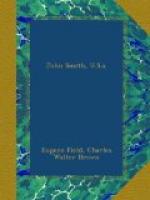Soon, Sestius, shall Plutonian shades
Enfold you with their hideous
seemings—
Then love and mirth and joys of earth
Shall fade away like fevered
dreamings.
LOVE SONG—HEINE.
Many a beauteous flower doth spring
From the tears that flood
my eyes,
And the nightingale doth sing
In the burthen of my sighs.
If, O child, thou lovest me,
Take these flowerets, fair
and frail,
And my soul shall waft to thee
Love songs of the nightingale.
HORACE II, 3.
Be tranquil, Dellius, I pray;
For though you pine your life away
With dull complaining breath,
Or speed with song and wine each day—
Still, still your doom is
death.
Where the white poplar and the pine
In glorious arching shade combine
And the brook singing goes,
Bid them bring store of nard and wine
And garlands of the rose.
Let’s live while chance and youth
obtain—
Soon shall you quit this fair domain
Kissed by the Tiber’s
gold,
And all your earthly pride and gain
Some heedless heir shall hold.
One ghostly boat shall some time bear
From scenes of mirthfulness or care
Each fated human soul!—
Shall waft and leave his burden where
The waves of Lethe roll.
So come, I pri’ thee, Dellius,
mine—
Let’s sing our songs and drink our
wine
In that sequestered nook
Where the white poplar and the pine
Stand listening to the brook.
THE TWO COFFINS.
In yonder old cathedral
Two lonely coffins lie;
In one the head of the state lies dead,
And a singer sleeps hard by.
Once had that king great power,
And proudly he ruled the land—
His crown e’en now is on his brow
And his sword is in his hand!
How sweetly sleeps the singer
With calmly folded eyes,
And on the breast of the bard at rest
The harp that he sounded lies.
The castle walls are falling
And war distracts the land,
But the sword leaps not from that mildewed
spot—
There in that dead king’s
hand!
But with every grace of nature
There seems to float along—
To cheer the hearts of men—
The singer’s deathless
song!
HORACE I, 31.
As forth he pours the new made wine,
What blessing asks the lyric
poet—
What boon implores in this fair shrine
Of one full likely to bestow
it?
Not for Sardinia’s plenteous store,
Nor for Calabrian herds he
prayeth,
Nor yet for India’s wealth galore,
Nor meads where voiceless
Liris playeth.
Let honest riches celebrate
The harvest earned—I’d
not deny it;
Yet am I pleased with my estate,
My humble home, my frugal
diet.




